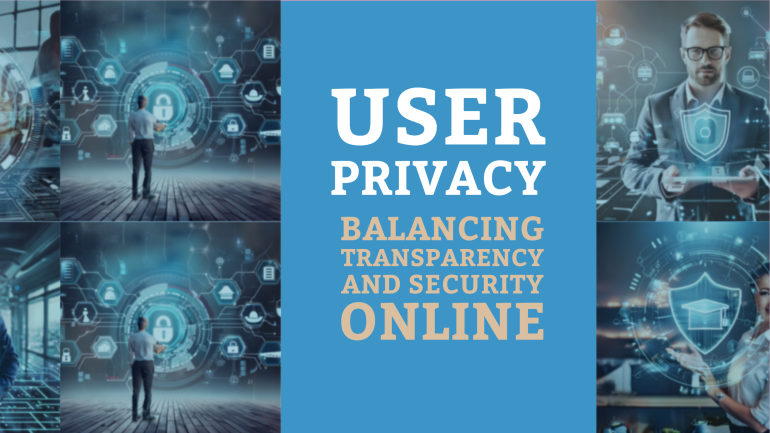This website uses cookies so that we can provide you with the best user experience possible. Cookie information is stored in your browser and performs functions such as recognising you when you return to our website and helping our team to understand which sections of the website you find most interesting and useful.
Table of Contents
You may also interested:
TL;DR: User Privacy: Balancing Transparency and Security Online
- User consent is crucial in balancing transparency and security online.
- Implementing encryption can enhance user privacy without compromising security.
- Regular transparency reports can help build trust with users and demonstrate commitment to privacy.
- Clear privacy policies are necessary in providing users with information about how their data is collected and used.
- Collaboration between companies, regulators, and users is key in finding the right balance between privacy and security.
Most internet users are unaware of the threats to their privacy online and the delicate balance required between transparency and security. In an age where data breaches and cyber attacks are rampant, it is crucial to understand how to navigate the digital landscape without compromising personal information. This blog post investigates into the importance of privacy protection while highlighting the significance of maintaining transparency from online platforms. By striking a balance between user privacy and security measures, individuals can enjoy a safer and more secure online experience.
The Evolution of Online Privacy
Historical Perspective on Privacy
Online privacy has always been a concern since the early beginnings of the internet. As individuals started sharing personal information on digital platforms, questions about data security and privacy arose. However, in the early days, many users were unaware of the implications of their online activities and the potential risks associated with sharing personal information online.
Modern-Day Concerns and Changes
Privacy concerns in the digital age have escalated to unprecedented levels. With the rise of social media, e-commerce, and digital communication, user data has become a valuable commodity for companies and hackers alike. Modern-day users face constant threats to their privacy, ranging from targeted advertising and data breaches to invasive tracking technologies. These concerns have prompted significant changes in the way privacy is perceived and protected online.
As the internet continues to evolve, so do the methods of data collection and privacy infringements. Companies have access to more personal data than ever before, leading to a heightened risk of identity theft and privacy violations. However, there is also a growing awareness among users about the importance of protecting their online privacy, leading to increased demand for transparency and security measures from digital platforms.
Transparency in the Digital Age
Openness vs. Confidentiality
If we talk about transparency in the digital age, we inevitably come across the dilemma of openness versus confidentiality. On the one hand, users demand more transparency from companies regarding how their data is being used. On the other hand, businesses need to ensure the confidentiality and security of sensitive information. Striking a balance between these two aspects is crucial to building trust with users while safeguarding their data.
The Right to Know and Data Collection Practices
The right to know and data collection practices are at the forefront of the privacy debate in the digital age. Users have the right to know what data is being collected about them, how it is being used, and who it is being shared with. Companies must be transparent about their data collection practices to build user trust and comply with regulations.
Practices: It is necessary for companies to be transparent about their data collection practices to ensure users are aware of how their information is being utilized. Failure to disclose these practices can lead to breaches of trust, privacy violations, and potential legal ramifications. By providing clear information about data collection, companies can empower users to make informed decisions about their online privacy.
Security Measures for Protecting Privacy
Encryption and Anonymity Tools
All online communications and data transmissions are vulnerable to interception and surveillance. With the rise in cyber threats, using encryption and anonymity tools has become imperative for safeguarding user privacy. Tools like Virtual Private Networks (VPNs), end-to-end encryption services, and anonymous browsing platforms can help users protect their sensitive information from prying eyes. The use of these tools ensures that data remains secure and private, away from potential attackers or eavesdroppers.
Regulation and Compliance
One of the key ways to protect user privacy online is through regulatory measures and compliance standards. Governments and regulatory bodies have set guidelines and laws that organizations must adhere to in order to protect user data. By complying with regulations such as the General Data Protection Regulation (GDPR) or the Health Insurance Portability and Accountability Act (HIPAA), organizations can ensure they handle personal information responsibly and securely. Failure to comply with these regulations can result in severe penalties and damage to reputation.
Understanding
Regulation and Compliance play a crucial role in maintaining user privacy online. Organizations that prioritize compliance not only protect user data but also build trust with their customers. Adhering to regulatory standards demonstrates a commitment to data security and user privacy, creating a positive reputation in the eyes of consumers. Understanding the implications of non-compliance is imperative in today’s digital landscape, where data breaches and privacy violations are prevalent.
Reconciling Privacy with Business and Government Interests
The Need for Balanced Privacy Policies
Not all businesses and government agencies view privacy in the same way. While businesses often prioritize data collection for marketing and operational purposes, governments may prioritize access to data for security and law enforcement reasons. Balancing these interests can be challenging, but it is necessary to protect user privacy while meeting the needs of both sectors.
Government Surveillance and Data Requests
For governments, surveillance and data requests are crucial tools in combating crime and ensuring national security. However, they also raise significant concerns about invasion of privacy and abuse of power. Government surveillance can be indiscriminate and intrusive, potentially compromising the privacy of innocent individuals. It is important for regulations to be in place to limit the scope of surveillance and protect the rights of citizens.
Requests for user data from tech companies by government agencies have increased in recent years, sparking debates about privacy and security. Tech companies must navigate these requests carefully, balancing legal obligations with user trust. Transparency about data requests and strict policies on handling user information are necessary to safeguard user privacy.
To wrap up
Presently, balancing transparency and security online is a critical challenge that requires a delicate approach. While users deserve to have their privacy protected, it is also important to ensure that security measures are in place to safeguard against potential threats. By implementing clear and transparent privacy policies, users can make informed decisions about how their data is being used. At the same time, companies must prioritize security measures to prevent unauthorized access to sensitive information. Finding the right balance between transparency and security is crucial for building trust with users and maintaining a safe online environment for all.
FAQ
Q: Why is user privacy important online?
A: User privacy is important online to protect sensitive personal information, prevent identity theft, maintain confidentiality, and ensure trust in online interactions.
Q: What are some common threats to user privacy online?
A: Common threats to user privacy online include data breaches, hacking, phishing attacks, tracking cookies, surveillance, and unauthorized access to personal information.
Q: How can users protect their privacy online?
A: Users can protect their privacy online by using strong, unique passwords, enabling two-factor authentication, being cautious about sharing personal information, using VPNs for secure browsing, and regularly updating privacy settings.
Q: What is the role of transparency in balancing user privacy and security online?
A: Transparency plays a crucial role in balancing user privacy and security online by ensuring that users are informed about how their data is collected, used, and shared, allowing them to make informed decisions about their online activities.
How do companies balance the need for transparency with ensuring security of user data?
A: Companies can balance the need for transparency with ensuring security of user data by implementing clear privacy policies, obtaining user consent for data collection, using encryption techniques to secure data, and regularly auditing their security practices to address any vulnerabilities.





